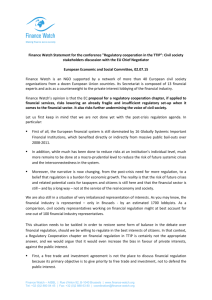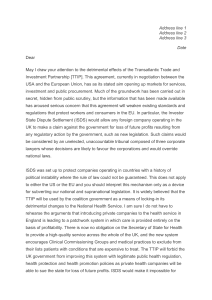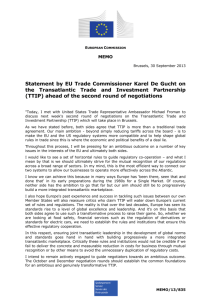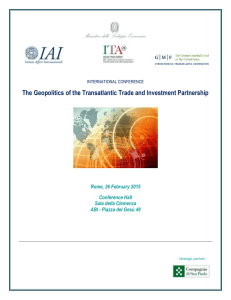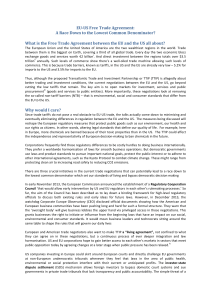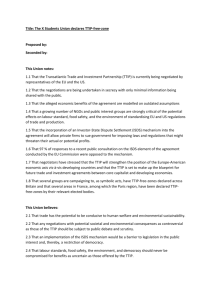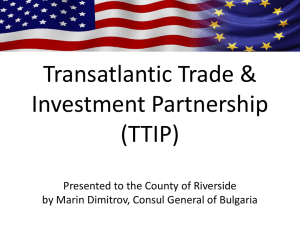How much does the TTIP have in common with ACTA?
advertisement
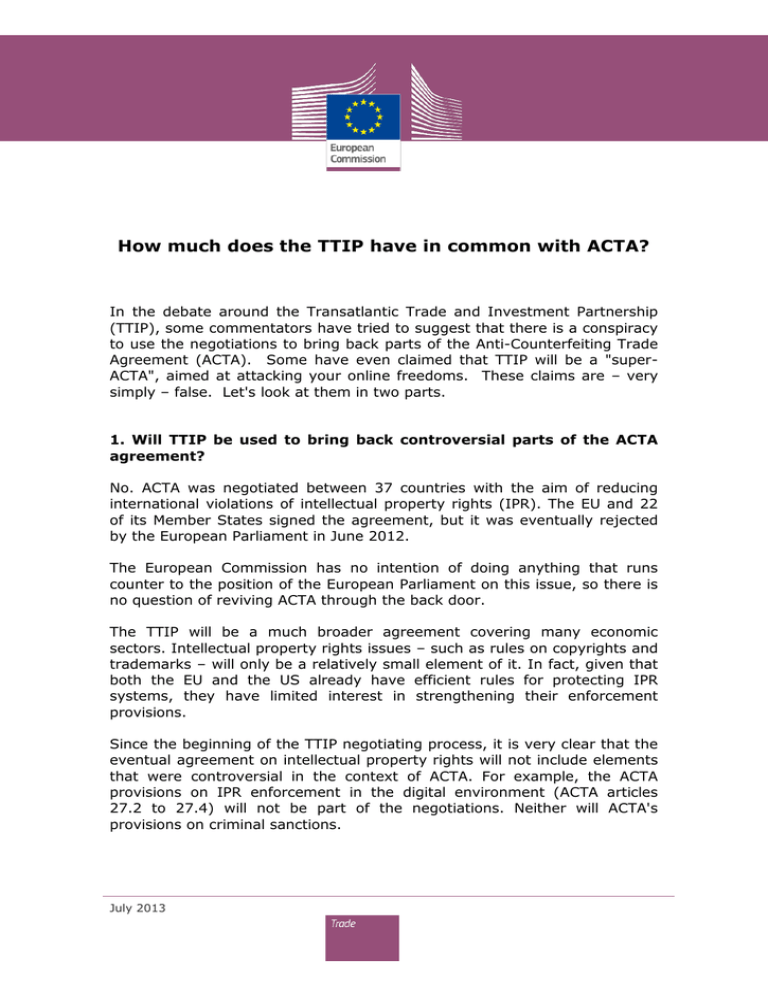
How much does the TTIP have in common with ACTA? In the debate around the Transatlantic Trade and Investment Partnership (TTIP), some commentators have tried to suggest that there is a conspiracy to use the negotiations to bring back parts of the Anti-Counterfeiting Trade Agreement (ACTA). Some have even claimed that TTIP will be a "superACTA", aimed at attacking your online freedoms. These claims are – very simply – false. Let's look at them in two parts. 1. Will TTIP be used to bring back controversial parts of the ACTA agreement? No. ACTA was negotiated between 37 countries with the aim of reducing international violations of intellectual property rights (IPR). The EU and 22 of its Member States signed the agreement, but it was eventually rejected by the European Parliament in June 2012. The European Commission has no intention of doing anything that runs counter to the position of the European Parliament on this issue, so there is no question of reviving ACTA through the back door. The TTIP will be a much broader agreement covering many economic sectors. Intellectual property rights issues – such as rules on copyrights and trademarks – will only be a relatively small element of it. In fact, given that both the EU and the US already have efficient rules for protecting IPR systems, they have limited interest in strengthening their enforcement provisions. Since the beginning of the TTIP negotiating process, it is very clear that the eventual agreement on intellectual property rights will not include elements that were controversial in the context of ACTA. For example, the ACTA provisions on IPR enforcement in the digital environment (ACTA articles 27.2 to 27.4) will not be part of the negotiations. Neither will ACTA's provisions on criminal sanctions. July 2013 The EU does have some specific objectives on intellectual property in the TTIP negotiations. Our priority, along with a number of other issues, is to secure improved protection for so-called geographical indications like Parma ham, Roquefort cheese and various wines and spirits. This is unrelated to the controversies around ACTA, but very important for European food and drink sector. 2. Will TTIP bring in new provisions that would restrict internet freedom? No. This claim is based on a misunderstanding of an earlier version of a draft paper that became public. That draft paper set out the EU's initial views on what the TTIP should do to strengthen transatlantic trade over the internet. Of course, the “Super-ACTA” term sounds quite sensational, but the final version of our proposal is nothing of the sort. In particular, it would be difficult to find there any arguments supporting three specific claims: A. The negotiations will lead to rules on the liability of internet service providers (ISP). They will not. In previous EU trade agreements, like the EU-Korea FTA, the sections on intellectual property rights and electronic commerce did indeed refer to ISP liability because our partners’ regimes were not of an equivalent standard to the EU’s rules. At an earlier stage of the EU's planning for the TTIP we did consider including one of these references – the one contained in the section on electronic commerce. The earlier draft paper reflects that fact. However, after internal EU discussions the EU has decided not to pursue any provision on ISP liability in the TTIP negotiations. This is because both the EU and the US already have well established and efficient rules defining when internet service providers can be held liable – and when they cannot. These rules apply not only to intellectual property rights infringements, but also to the dissemination of child pornography or other serious crimes. The existing rules are widely considered as balanced and effective and there have been no requests by stakeholders – either industry or civil society – to modify them in the TTIP. To be clear, even the dropped proposal referred to in the earlier draft paper that became public would not have tried to modify the US system, much less change the current EU regime. Instead, it was about encouraging the exchange of information between governments about their legislation in this area. The idea would have been to use that information to make sure exporters are informed about the laws they have to comply with in the partner country, not to change that law or restrict future policies on this issue in any way. 2 B. The discussions on electronic commerce will undermine consumer protection, including on data privacy. This is also untrue. The EU made it very clear that its standards of data privacy protection are not up for discussion in this agreement. They will not be weakened. Various other aspects of the digital economy will however be covered by the negotiations to make sure that the rules we have on either side of the Atlantic do not unnecessarily act as barriers to trade. That is not the same thing as undermining the online protection of internet users. In fact, in many areas these rules will strengthen those protections. For instance: The EU proposes that both parties should have rules on anticompetitive practices applying to major suppliers of electronic communication services. That means making sure that major telecommunication suppliers do not block competition from smaller market players. More competition between companies means more choice for the consumer and often lower prices. We are also looking at number portability, or the possibility of keeping your existing telephone number when switching from one mobile operator to another. This agreement would aim at making it much easier for consumers to switch from service providers even across the Atlantic. The EU also proposes recognising that e-commerce services should not be subject to customs duties. This means, for example, that econsulting or other online services which you would acquire from an overseas supplier would not be subject to custom duties. That means lower prices for the end-consumer. The EU also proposes cooperating on rules on the “treatment of unsolicited commercial communications”, in other words SPAM. EU and US law already has rules on how you can buy and sell things online, without being flooded by spam. The TTIP will ensure that both parties exchange views on those respective rules. C. The talks will weaken cybersecurity The European Union has expressed clearly its concerns on alleged US intelligence activities and their implication for privacy and data protection at European level. We are committed to the Transatlantic Trade and Investment Partnership, but we insist – and the US has agreed – that in parallel there be work in two new EU-US working groups to analyse the oversight of intelligence activities, intelligence collection and also the question of privacy and data protection. These groups have already met and the EU expects that they will now make rapid progress. For the TTIP to be a success, we need confidence between the partners. And confidence can be 3 only be fostered if there is a clarification of these issues of very serious concern. However, the TTIP negotiations themselves will not focus on these issues. In conclusion, TTIP is neither ACTA, nor Super-ACTA, just a good deal for Europeans. This agreement has real potential to deliver a growth boost to the European economy – between 0.5 and 1% of GDP by our best estimate. Given the scale of today's online economy, online trade barriers are just as important as offline ones and the TTIP needs to tackle them. That is what Europe's proposals on information and communication technologies are about - not about undermining rights or freedoms. One last point: a more open process The EU is committed to providing as much information as possible to the public, the media, and the many stakeholders as we proceed with the negotiations. There is more interest in this potential deal than any we have worked on before. We realise that this requires new initiatives to shed more light on what is going on throughout the negotiations. Several tools have been put in place: We have created a dedicated webpage to the TTIP negotiations. On this webpage, you can find a timeline, which details the events taking place, as well as providing overviews of the negotiating rounds. We have also published a detailed Frequently Asked Questions page on the EU-US negotiations. This FAQ is available in all official EU languages and gives an answer to many of the questions you may have. The EU Commission's Trade Department now also has two dedicated Twitter accounts. One general account and one account specifically for the TTIP negotiations. The latter – @eu_ttip_team – is managed directly by negotiators and gives you a behind the scenes look at how the negotiations are progressing. We tweet in real time and give you updates on the negotiations as well as details on where to find more relevant info online. The team will also reply to your questions and comments. The Commission will continue – as it did during the year-long preparations – to reach out to industry, civil society, the media and the general public whenever the opportunity allows. On 17 May 2013, we held a civil society meeting on Intellectual Property Rights in the TTIP where we dispelled rumours about similarities between TTIP and ACTA. Stakeholder events also took place in Washington on 10 July 2013 and on 16 July 2013 in Brussels. Before the first round of talks (8-12 July 2013), the European Commission held a briefing for the press where the chief negotiator answered questions from journalists. Another debriefing for the media was held on 18 July 2013. 4 The European Commission will also keep the Member States – in the Council – and the European Parliament abreast of developments. At the end of the negotiations, it is these two institutions – the Council containing representatives of Member States' governments and the directly elected European Parliament – that will approve or reject the agreement. For further information TTIP negotiations website Frequently Asked Questions about the Transatlantic Trade and Investment Agreement The EU-US trade relationship Civil Society Dialogue meetings Transparency in EU trade negotiations 5
